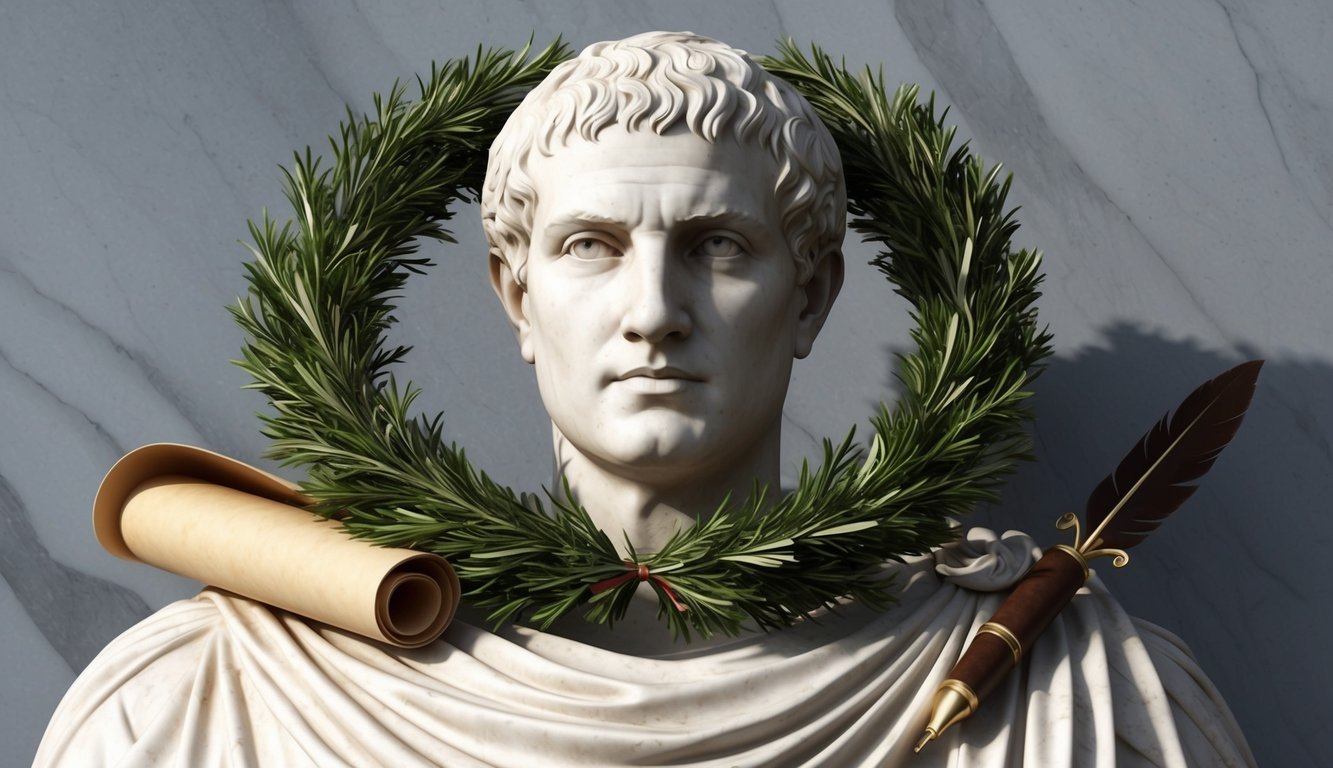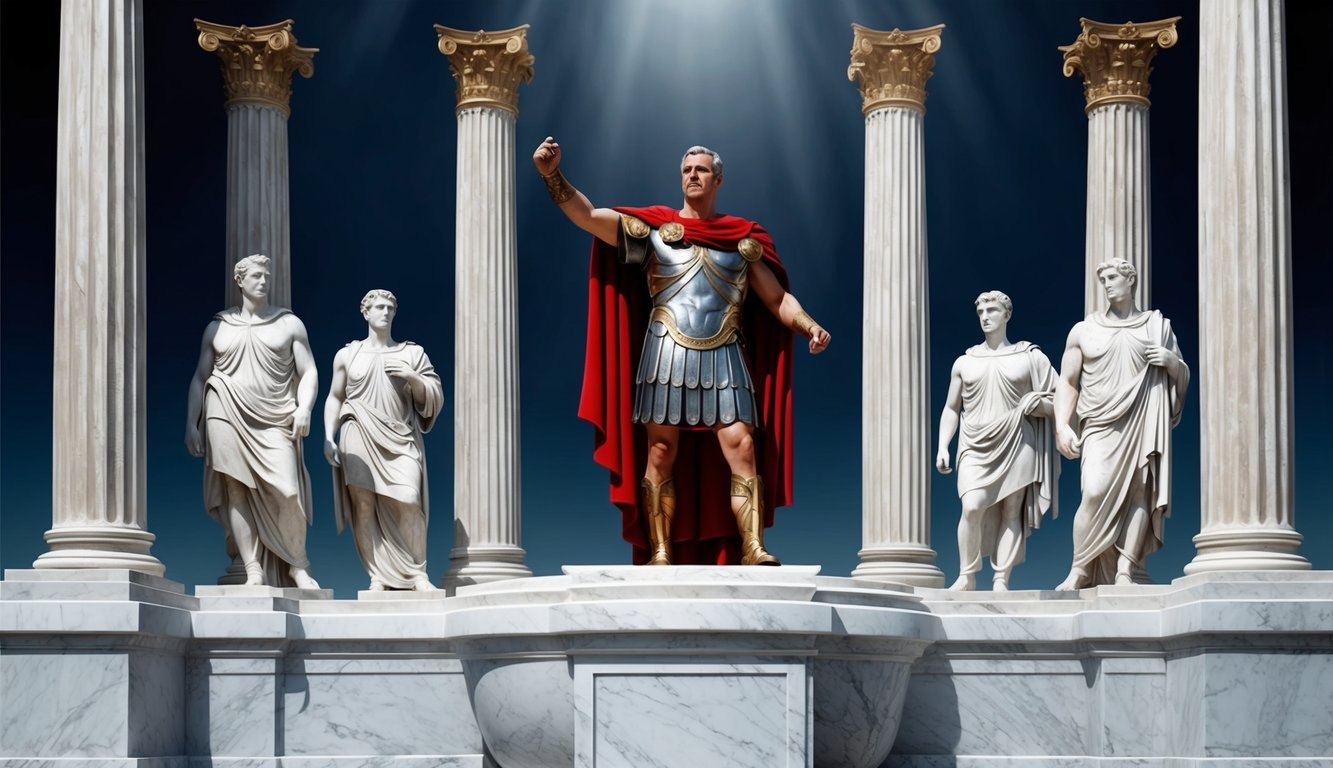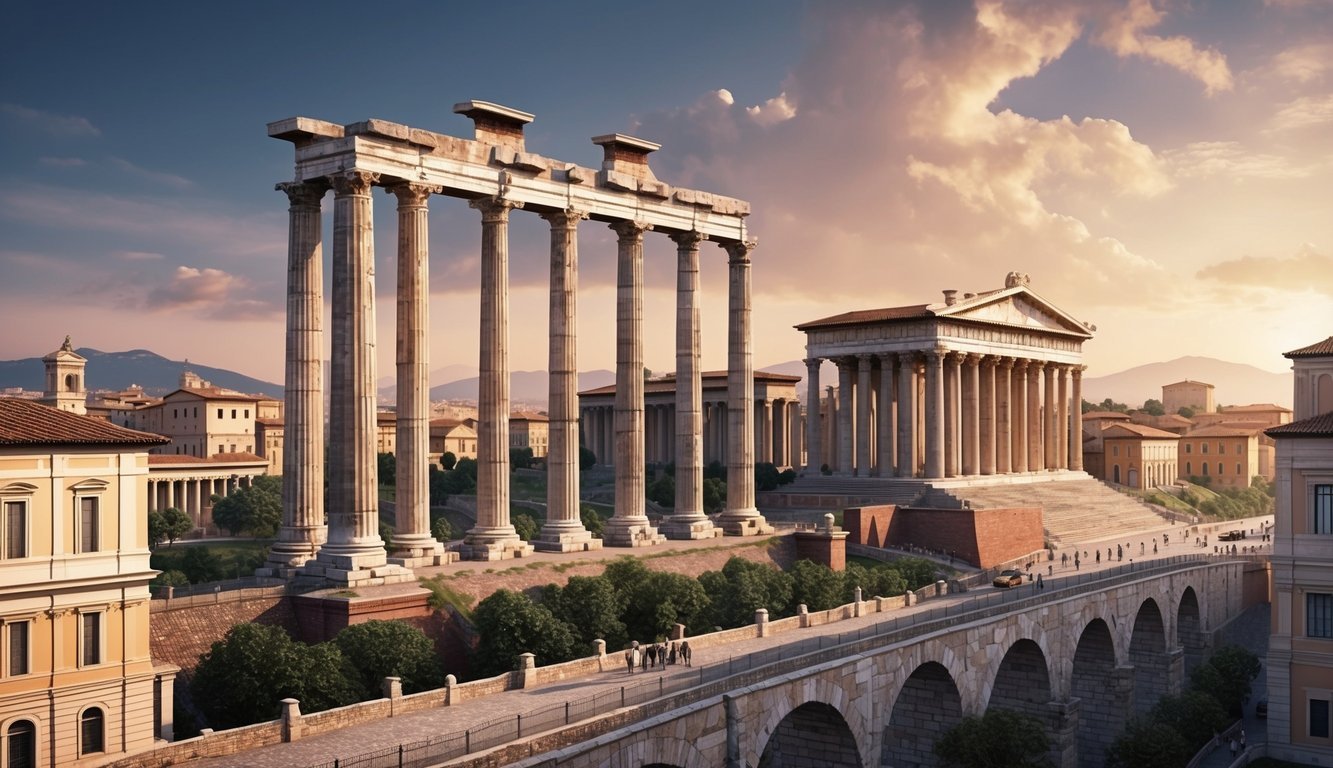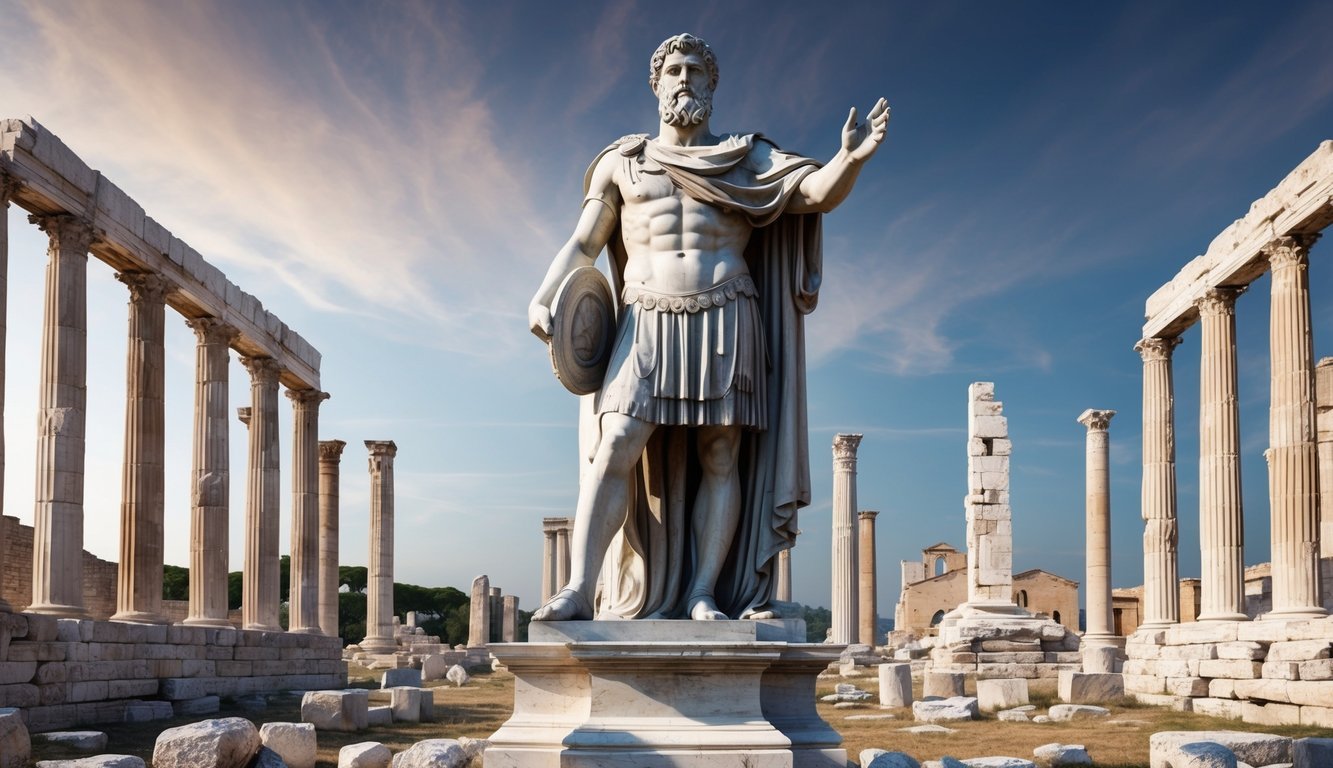Augustus, also known as Gaius Julius Caesar Octavianus, was a pivotal figure in Roman history.
He became the first emperor of Rome, ruling from 27 BC until his death in AD 14, and transformed the Roman Republic into the Roman Empire.
His rise to power followed the chaos after Julius Caesar’s assassination, where he emerged as his great-uncle’s heir and strategically navigated a complex political landscape.

With a reign marked by significant reforms and cultural advancements, Augustus implemented policies that stabilized and enriched the empire.
He established a lasting legacy, fostering an era known as the Pax Romana, a time of relative peace and prosperity.
His contributions went beyond politics; he is credited with inspiring art, literature, and a new Roman identity that shaped the empire for centuries.
Augustus’s story is one of ambition, political acumen, and transformation.
From a young man named Octavian to the esteemed title of Augustus, he left an indelible mark on history, blending military success with governance to redefine the concept of leadership in Rome.
Rise to Power
Augustus, initially known as Octavian, embarked on a remarkable journey to power marked by strategic alliances and military triumphs.
His rise involved critical events that shaped the Roman state and established him as its first emperor.
Early Life and Adoption by Julius Caesar
Born Gaius Octavius in 63 BC, Augustus hailed from a wealthy family.
His early life was relatively privileged, but everything changed in 44 BC when his great-uncle Julius Caesar adopted him as his son.
This adoption not only enriched his status but also set him on the path to power.
Upon Caesar’s assassination, Octavian, only 18 at the time, quickly recognized the turmoil and opportunities arising from the power vacuum left behind.
He skillfully maneuvered through the chaos, claiming his inheritance and positioning himself as a central figure in Roman politics.
Formation of the Second Triumvirate
In 43 BC, Octavian formed the Second Triumvirate with Mark Antony and Lepidus.
This alliance aimed to consolidate power and eliminate Caesar’s assassins, primarily Brutus and Cassius, who were responsible for Caesar’s death.
The triumvirs held significant power, enabling them to reform the Roman Republic and distribute its governance.
The relationship among the triumvirs was complex.
While they initially worked cohesively, tensions arose, especially between Octavian and Antony.
Ultimately, this disintegration would later contribute to the fall of the Triumvirate and open the way for Octavian’s ultimate dominance.
Overthrow of Mark Antony and Cleopatra
The split between Octavian and Antony led to increasing hostility, culminating in the infamous Battle of Actium in 31 BC.
This naval confrontation pitted Octavian’s fleet against Antony and Cleopatra’s forces.
The battle concluded decisively in favor of Octavian, marking a pivotal moment in his ascent.
Following their defeat, Antony and Cleopatra fled to Egypt.
In 30 BC, realizing that their position was untenable, they took their own lives.
With their defeat, Octavian effectively eliminated his rivals and consolidated power, paving the way for the establishment of the Roman Empire and his title as Augustus.
Consolidation of Power

Augustus implemented various strategies that allowed him to consolidate power in Rome.
By reforming governmental structures and maintaining a peace that marked his reign, he ensured stability in the empire.
Succession plans also played a pivotal role in securing his legacy and the future of Roman leadership.
Reforms and Centralization of Authority
Augustus initiated significant reforms to centralize authority within the Roman state.
He restructured the Senate, reducing its size and increasing his influence over its members.
By emphasizing titles like Princeps, meaning “first citizen,” he presented himself as a leader among equals, even while holding vast power.
He also established the Proconsul role, allowing him to govern provinces effectively.
This role enabled him to oversee military affairs while ensuring loyalty from the armies stationed in these regions.
These reforms strengthened Augustus’s grip on power and laid the foundation for the Principate system.
Building the Pax Romana
The Pax Romana, a period of relative peace and stability, became a hallmark of Augustus’s reign.
Through diplomatic efforts and strategic military campaigns, he expanded and secured the empire’s borders.
This approach not only reduced the need for constant military engagement but also fostered economic prosperity.
During this time, trade flourished, and infrastructure projects thrived, such as roads and aqueducts.
These developments enhanced communication and integration across vast territories.
The Roman peace under Augustus was crucial in allowing cultural exchange and administrative growth, cementing his legacy as a stabilizer of the empire.
Succession Plans and Family
Augustus understood the importance of securing a stable succession.
He carefully navigated family dynamics to position his heirs strategically.
His adoption of Tiberius, his stepson, was a significant move, as it ensured a direct line of succession.
Other potential heirs included Drusus and Marcellus, but Augustus focused on Tiberius due to his military experience and loyalty.
Meanwhile, he married Julia, his only biological child, into influential families to strengthen political alliances.
This foresight in managing his family not only safeguarded Augustus’s legacy but also shaped the future of the Roman leadership.
Public Works and Cultural Achievements

Augustus significantly reshaped Rome through extensive public works and cultural initiatives.
His reign marked a time when infrastructure flourished, the arts thrived, and monumental structures celebrated Roman values and achievements.
Infrastructure and Urban Development
Augustus invested heavily in improving Rome’s infrastructure.
He famously declared that he had found Rome a city of bricks and left it a city of marble.
Key projects included the construction of new roads, aqueducts, and public buildings.
The Forum of Augustus was one of his most notable developments.
This grand forum provided space for political and public activities, adorned with majestic statues.
Improved infrastructure revitalized city life and commerce, making it easier for citizens to engage with their community.
Patronage of the Arts
Under Augustus, the arts flourished as he became a key patron.
Prominent poets like Virgil, Horace, and Ovid produced works that celebrated Roman ideals.
Virgil’s Aeneid became a national epic, linking Roman history with myth.
Augustus supported playwrights and encouraged drama by funding the Theatre of Marcellus, a significant cultural venue.
Maecenas, his close advisor, was instrumental in promoting literary talents, ensuring that Rome’s cultural life thrived during this period.
Religious and Ceremonial Monuments
Religious structures and monuments were central to Augustus’s vision.
The Ara Pacis, or Altar of Peace, symbolized the peace and prosperity he brought.
This striking monument featured intricate reliefs celebrating nature and mythology.
He also emphasized traditional Roman values through temples, such as the Temple of Mars.
These buildings were not only places of worship but also reflected Augustus’s power and connection to the divine.
They showcased his commitment to restoring religious practices that reinforced his authority and the stability of the Empire.
Legacy and Reflection

Augustus left a lasting impact on the Roman Empire, shaping its political structure and cultural landscape.
His reign introduced a new era of governance and creativity that influenced generations to come.
Augustus’ Influences on Imperial Rome
Augustus transformed the Roman Republic into an empire through the establishment of the Principate.
He centralized power while maintaining the illusion of republican governance.
This system allowed for a strong, stable leadership that became the model for future emperors in the Julio-Claudian dynasty.
His ability to balance power and public image solidified his legacy.
Augustus was often deified after his death, highlighting the respect he garnered.
His emphasis on law, efficiency, and order laid the groundwork for a new bureaucratic system that supported Roman expansion and stability.
The Augustan Cultural Revolution
Augustus’ reign marked a significant cultural shift in Rome, often referred to as the Augustan Cultural Revolution.
He patronized the arts, promoting literature, architecture, and public works.
Writers like Virgil and Horace flourished, creating timeless works that celebrated Roman values and mythology.
The construction of monumental buildings, such as the Forum of Augustus, showcased Rome’s grandeur.
His focus on cultural identity helped solidify Roman society’s values, linking them to the idea of imperialism and national pride.
This artistic surge influenced the Greco-Roman world and established cultural standards enduring for centuries.
Historical Perspectives and Modern Interpretations
Historians have noted Augustus’ dual legacy.
They see him as a reformer who brought peace (Pax Romana) and prosperity.
However, some critique him for dismantling the traditional Republican government and ushering in imperial rule.
Modern interpretations of Augustus’ reign recognize the complexities of his leadership.
While he enacted beneficial policies for Roman society, the consolidation of power paved the way for future autocracies.
His impact is debated, but it’s clear that Augustus shaped both the structure of the Roman Empire and its cultural identity, creating a legacy that historians still study today.


